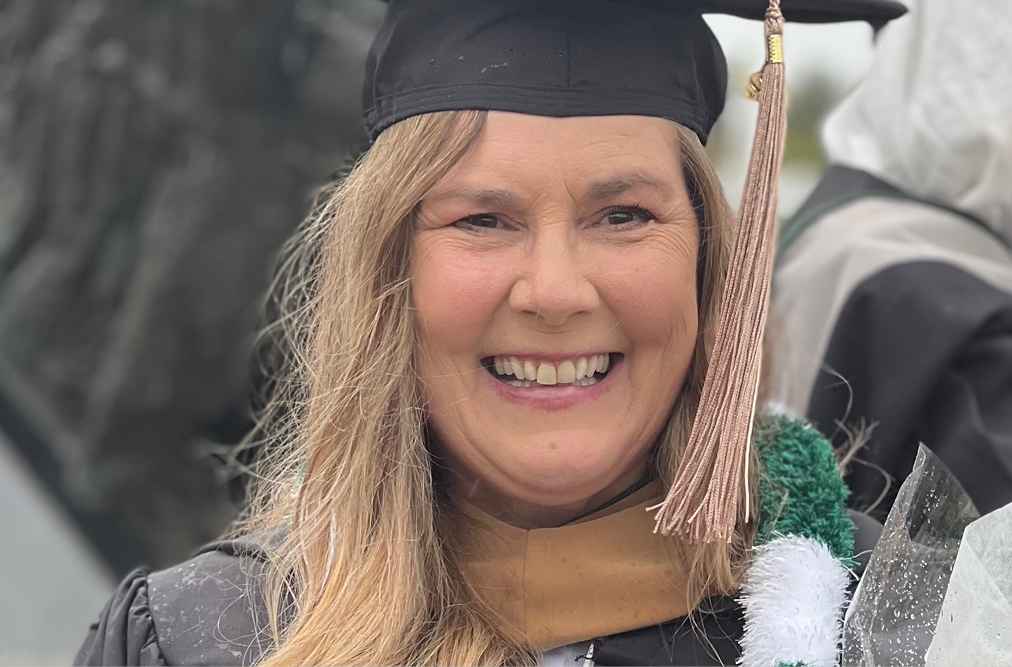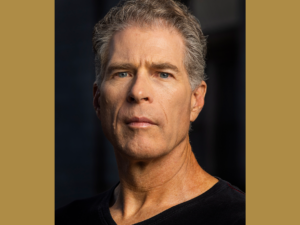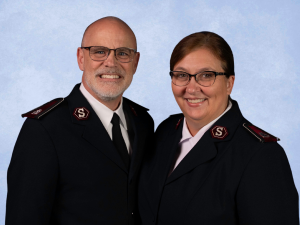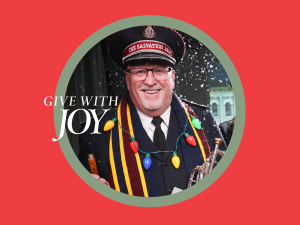What’s bigger than Starbucks and Google combined?
A $150 billion industry?
Involving 25 million people worldwide?
It’s human trafficking. And it’s a problem in your community.
Across the U.S., The Salvation Army has 49 anti-trafficking programs. Recent statistics show The Salvation Army served 4,415 trafficking survivors in just one year.
Erin Kauffman is the Housing Director for one of those Salvation Army anti-trafficking programs, called Stepping Stones, in Spokane, Washington.
She’s worked to help trafficking victims become survivors for many years, including most recently as the SEEDS of Hope Program Coordinator in Las Vegas.
These are people, much like all of us, she’ll tell you, searching for love and belonging.
And she’s on the show to share more about The Salvation Army’s anti-trafficking work and some of the myths surrounding the issue.
Show highlights include:
- Erin’s story and what led her into anti-trafficking work with The Salvation Army.
- Where human trafficking is a problem.
- The state of the issue today.
- How The Salvation Army fights human trafficking.
- Why this ministry is key for The Salvation Army.
- What is involved in Erin’s role.
- How the pandemic changed the way she works.
- Statistics from The Salvation Army’s 2021 National Annual Impact Report on the number of anti-trafficking programs, staff members in anti-trafficking positions, people trained and survivors served.
- What that service to survivors includes.
- A story of a survivor Erin’s worked with.
- The biggest misconception around trafficking.
- What Erin has learned from working with survivors through the years.
- How people in the Church can better love those who are survivors of trafficking.
- One way to get involved in this work today.
Listen and subscribe to the Do Gooders Podcast now. Below is a transcript of the episode, edited for readability. For more information on the people and ideas in the episode, see the links at the bottom of this post.
* * *
Christin Thieme: Erin, welcome to the Do Gooders Podcast. Thank you for being here today.
Erin Kaufmann: Oh, well, thank you for having me. I appreciate just the opportunity to share about a wonderful ministry.
Christin Thieme: Absolutely. And as we get started here, can you tell us a little bit about your story and how you ended up working in this field of anti-trafficking with The Salvation Army?
Erin Kaufmann: I can try and give the short and long version. I came to The Salvation Army in the early 90s’, when I was 24, kind of bankrupt from what the world had to offer. I was raised by a good, hardworking family in Michigan, and somehow the messages that my parents tried to teach me, I lost it in the translation somehow. And my parents were retired in Las Vegas when I was, as soon as I graduated high school, and small town girl from East Lansing, Michigan, moving to Las Vegas—there was a lot in Las Vegas.
And I went to college and I was working at KinderCare. I was going to be a teacher. And when I was 20, I met this man and he was about 14 years older than me. So I was 20, he was 34 and invited me for a date. And the first date was that we were flying from Las Vegas to San Francisco for dinner and …
Christin Thieme: Oh, wow.
Erin Kaufmann: Yeah. For someone who’s 20. Then he was clean cut. He was a son of a police chief. But he was a professional poker player. And for the next four years, I was with him and my parents came, they were much older than me and they had come from the depression. So by the time I came, I was the last of five kids. By the time I came, they had money. My dad has his PhD. My mom was in banking and my parents want to do what any parents do was give their children a better life than what they had.
So somehow I got the message that money and outward appearances and all these things were what was important. Somehow that’s how I received it. So when I got to Las Vegas and I was showered with gifts and money, and eventually doing cocktails, making $500 a day, being a teacher was not so important anymore because I thought it was about acquiring things and having things and traveling and living in Mexico and New Orleans and traveling the country.
So for four years, I was with this person. And by the time I was 24, I had a house and a Jeep and a dog and a matching dress. And I was miserable. Over the four years, I had all this stuff, but I also had a drinking problem and I had a 10 year eating disorder. And that’s when I was introduced to The Salvation Army in Las Vegas, to the ARP [Adult Rehabilitation Program]. And I went through at such a good time. The focus was on ministry and mission. And I fell in love. I fell in love with the ministry. I fell in love with God, and I found out how much I was loved by God and by others, that I ended up staying.
I’ve been with The Salvation Army for almost 30 years now. And once that hope was shared with me, I couldn’t think of any other way to live except to share that hope with someone else, somehow, some way. If I was a 24-year-old young woman who didn’t know the love of Jesus, there had to be other people like me out there.
So I began to work for The Salvation Army. I worked in Las Vegas for almost 10 years, and that’s when my husband and I received the call that God wanted more. We entered training school and served as officers for quite some time. And then I had some health issues and that’s when I took some time off. And during my ministry and service, God, somehow, some way brought women, who were victims of trafficking, and whether that was in Tucson or Las Vegas, but it wasn’t until I was in Las Vegas, kind of recovering from some health scare that I went to work for Refuge for Women.
And the director was an officer, a former officer from the Central Territory. And I started working for the Refuge for Women as an assistant director. And when I heard the stories of the women and kind of relating to what … I wasn’t in a trafficking situation myself, but to understand, I think not just women, but people just want, they want to be loved, they want to belong. And that part of us that looks outside of ourself for that love and belonging, I could relate to the women in the Refuge for Women, which is a house, a residential program for human trafficking victims.
And when I heard the stories there, God rekindled the fire. He reminded me of my calling and spending time. I was there for quite a few months, working with women that had just come out of trafficking, victims. Some that have been in for seven or eight years, and just working with these women, hearing their heart and being able to pour life and love and hope into them, it just became a passion of mine. And I had the privilege to, when in Las Vegas with The Salvation Army, the Seeds of Pope program had been closed for a few months.
So I had the privilege to go back to my job in Las Vegas, as an employee in The Salvation Army and rebuild the program. And we were fortunate enough to have quite a few apartments there. And we were able to rebuild the program, the human trafficking program in Las Vegas. And I mean, that’s how I came to The Salvation Army. And when I’m on this side of it, I see God’s hand in every single piece of it.
Each woman that he brought, even I’ve had two men as well that have either been trafficked through labor or sex trafficking, but God, I see God has ordained that, organized it and introduced me to it and even softened my heart and allowed me go through some experiences where I’m in a place that I’m passionate about developing programs, writing grants, sharing this ministry with others, and what a wonderful privilege and opportunity is to help this group of women who really just want to be loved and to belong.
Christin Thieme: Yeah, absolutely. Can you give us an overview of the state of human trafficking today for those maybe—I mean, everybody’s heard of human trafficking, but for those who maybe aren’t that familiar with the actual state of the issue today. What are we looking at?
Erin Kaufmann: Well, and this is something that I had to change about myself as well, because we come to these, we have these myths and biases around human trafficking that it only happens in other countries and they have to be kidnapped and taken over country lines or state lines, but it happens in our communities. It happens over the internet.
Human trafficking happens in just, what it looks like today is a 21-year-old woman or 18-year-old young girl meets somebody, takes them out to get their nails done, takes care of them, tells them that they love them. And the women hope that this is the man of their dreams and that they’re going to spend their life with them. And couple months into the relationship, the money ends. And then the young girl or young woman is told that they don’t have any money. And if she really loved him that she would sell her body for sex and contribute to the family. And it’s just a temporary time.
And you find this in communities and families and all over, even young girls ages 12, 13 years old, right from our middle schools. It’s happening in our communities. The pandemic has forced so much of it to happen online through gaming or social media, and wonderful promises are made, again, to young women that want to believe the best, hope the best, and to be loved and to belong.
And they’re recruited, they’re groomed. And pretty soon they find themselves stuck. And seven years later, they are still stuck and then they’re filled with shame and they can’t go back home and they’re stuck. So it’s, yes, it does happen in other countries, especially Asian, Indonesia. It’s really quite bad, Europe, but it is happening in our neighborhoods today.
Christin Thieme: How does The Salvation Army fight against trafficking?
Erin Kaufmann: And I think I knew this at one point and I forgot that I knew this, but The Salvation Army, William and Catherine Booth, right from the jump, they worked hard to change. The age of prostitution was, the age of the legal consent was 13 years old. And for any of us that have children at 13 years old, that’s horrific.
So The Salvation Army has been passionate and involved in this since we started in the 1860s, but right now it’s in all of our programs, in our Adult Rehabilitation Programs, our ARCs [Adult Rehabilitation Centers], 50% of the women that are in our programs have been trafficked, in our shelters, in our food pantries and our corps, there are women that have been trafficked. So we’re helping them. But I think it’s getting the knowledge and getting education, getting trauma-informed, we can really make a difference because it’s a lot, that’s a lot more people than we think in our programs.
Christin Thieme: Sadly. So what about in your specific role, can you give us a picture of the work that you do there in Spokane?
Erin Kaufmann: Well, we’re just, here in Spokane, I’ve only been here right about six months. We’re fortunate here in Spokane to have quite a few transitional housing programs. We have a 31-unit family housing program, and then we also have some studio apartments. So we’re just working on some grants right now. And what The Salvation Army, even what we did in Las Vegas, was focus on the aftercare piece.
The legal department, the police department, the hotlines, the shelters usually are the ones that identify the human trafficking victims. And then the big question is what do we do with the victims so that they can become survivors? Like the big question, when you see on the news that a prostitution ring has been broken up, most of those women have been trafficked, but yet they’re taken to jails like they are criminals.
And how do we help them move from that state of victim to the victorious place of being a survivor? And I think that’s where The Salvation Army is set up perfectly to come alongside with the transitional housing piece, the case management piece, the life skills piece, the love and belonging piece, where you can be part of a community and be part of a family to build on that place of victim and shame and regret to become a survivor, who’s overcome and can achieve and go back to school and work and live in freedom again.
The Salvation Army is set up just so wonderfully that we can be part of the aftercare that we have in most of our programs as we work with veterans, or we work with folks struggling with mental illness and drug and alcohol issues, and 90% of the clients that have been victims struggle with each of those issues. So, The Salvation Army’s already experienced. We have expertise and we have education in these areas where we can help these women and men move from victim to survivor.
Christin Thieme: What does that change look like? I mean, you’ve touched on it a little bit, but how do you differentiate between victim and survivor?
Erin Kaufmann: Well, I think one of the biggest myths is that women in the sex industry, whether they’re selling their bodies for sex, or if they are in a strip club or any kind of online sex industry, that they’re there 100% by choice. And that is not the case. They will usually have a pimp or someone else in their life that is taking advantage of them by either force, fraud or coercion and any kind of exchange of sex, whether it’s for rent, for food, any kind of exchange by sex for anything else is considered human trafficking, sex trafficking.
So when a woman is in that place, their choices are gone. Their IDs may be taken away. The shame that even the threatening of family members, if they were to leave, it’s almost as if they are modern-day slaves. They’ve lost their choice. They don’t have any other options and they are stuck.
And then the whole gas lighting ensuring that, “You don’t deserve anything else. This is who you are. You’re nothing,” that just reinforces that that victim belief, but spending some time in The Salvation Army, under the care of, and we have wonderful employees in The Salvation Army, wonderful volunteers that have the opportunity, the high and holy calling to poor love and life and hope and options. And to these women, you slowly see it’s like an onion. You slowly see them come alive.
And to have them glint, even just a small glimpse of hope, you can see it in their face to go from just complete helplessness, hopelessness to you know what? “Maybe there is something good for me. Maybe I can turn this around. Maybe there is a God, who loves me and wants me to prosper and to give me a hope and a future,” and to see that and to share that is, I mean, it is a privilege and it is a high and holy calling that we get to do. It does take a little bit longer as we work with folks that have such trauma. The statistics share it’s three to five years as we move someone from victim to survivor, but it’s worth every minute and every day to give someone some hope, to share hope.
Christin Thieme: Yeah, that’s incredible. How has the pandemic changed the way that you work?
Erin Kaufmann: Well, it really did in Las Vegas. What happened in Las Vegas? There’s almost, I’d say 30,000 to 40,000 women that work in a strip club in any given day in Las Vegas. That’s how many strip clubs are in Las Vegas.
Christin Thieme: Wow.
Erin Kaufmann: And when those all closed, we had quite a few women that were able to kind of get free because they didn’t have the income to bring home to the people that were dependent on them. So we got real busy in Las Vegas. And unfortunately, when some of the victims got COVID, they would be kicked right out. I mean, they were no longer able to make money for the family business. So with a pandemic, we got really busy, which was a good thing, because that way we had more women that were able to leave some really bad situations.
And it continues. We continue to have women that are able to take advantage of the opportunities to be free and be given back the choice of not being stuck. It has gotten a lot worse as far as the internet goes, and it’s gotten a lot more web-based as far as pornography and selling sex online. And we just keep fighting. Like our motto, we continue to Fight for Freedom for these women every day. And as the world gets more evil, we get more of God and try to help more people to find that freedom.
Christin Thieme: Well, The Salvation Army’s 2021 National Annual Impact Report recorded 49 anti-trafficking programs across the US, 129 staff members who are in anti-trafficking positions. It said that 10,600 people were trained in 2021 and 4,415 survivors were served, which is incredible. Can you share a story of a survivor you’ve worked with, maybe something that stands out that kind of puts this into a more individual human perspective?
Erin Kaufmann: Yeah. I was very happily surprised to find out what wonderful programs we have in the United States. We have some great programs in Philadelphia and Baltimore, and then even Southern California. But I think one of the stories that I think, as a team that we work together in The Salvation Army, working with the program in, I think in Philadelphia, we had contact with one of the programs out there.
And very often sometimes, well, very often the best thing for some of our victims is to get out of the community that they’re in, often they’re triggered or retraumatized, or they see part of the family like in shelters or other areas that continue to recruit and threaten and force for them, force them back into the life.
So working with the program in Philadelphia, we were able to move a client and have that they flown, flew from Philadelphia to Las Vegas, and we were able to place a single victim of human trafficking into our transitional program in Las Vegas. And it’s not until, while the victim is in that fight or flight or freeze frame of mind or in the trauma, it’s very hard to heal because they’re just in survivor mode and they have physical things going on and they just, they can’t rest, they can’t have any peace to begin the healing process.
So being able to move the client from back east to Las Vegas, and then to begin the healing process, moved her into a single apartment where she wasn’t even able to cook her own meal for four or five years, the ability to go to the grocery store and pick out her own food, to decide when to go to sleep, when to wake up, to do her own laundry, to set up her own room, we were able to arrange some EMDR counseling that helped to work on some of the traumatic issues of her life.
We had some support groups, some art groups, Captain Lisa Barnes came in and taught some art classes. And just the way that The Salvation Army works together with all of the programs like you shared the many programs that we do have nationwide here with The Salvation Army on a national level, just to see this woman come alive and to be able to make choices, everyday choices that so many of us just take for granted, but when you’re a victim, all your choices are taken away. So she’s doing wonderful. And she’s continuing with her counseling and looking at reuniting back with her family. So it’s a victory all the way around.
Christin Thieme: Yeah, absolutely. Through all the years of your work in this arena, what have you learned from working with survivors?
Erin Kaufmann: I think we have so many biases and prejudice in the world today to really look at the survivors as children of God that just again want and what they did was biblical. They believed the best, hope the best on someone else. And someone took advantage of that, but just to come alongside someone, love them, give them space and time. Each journey is different. And one of the big pieces is that it’s going to look different for each journey, for each woman and just giving them the space and the time to become who God created them to be.
And I think that maybe 10, 15 years ago in this field of even recovery mental health, there was like a progression. They would do phase one, phase two, phase three, phase four, and then off they would go. But for victims of human trafficking, it’s fluid, it’s not linear and everybody’s journey’s going to look different. And each victory is going to look different for each person. And for us to define what victory looks like, we would be short-changing a lot of the survivor stories.
So I think that’s what I learned is that don’t put limitations, don’t put timelines, allow God to work. And his, God’s work is always the best work. And to see the beauty that comes out of these women’s lives is pretty incredible.
Christin Thieme: How would you say people in the Church can better love those who are coming out of this life and are on their way to becoming survivors?
Erin Kaufmann: I think the best way is education. Again, we have this confirmation bias, these ideas that we see in movies, or that we’ve learned that prostitution, that prostitutes are there by choice, that they’re standing on the street corner, that they are 100% there by choice. And that’s not the fact at all. I have 97% of women in the sex industry are not there by choice. They are handled by someone, again, through forced, fraud or coercion, they are there.
And educating ourselves, opening up our minds. One sin is not greater or less than any other sin. Everybody has struggles. Everybody has issues. And to just educate ourselves, not have any prejudice or preconceived ideas and look at these women as children of God and how can we love on them? How can we pour life into them? And I think that’s the best way that we can do, do anything to be part of the solution.
Christin Thieme: So for anybody listening, who really feels drawn to the work that you’re talking about, what’s one tangible thing that anybody could do today to help support The Salvation Army’s work around anti-trafficking?
Erin Kaufmann: I would say again to educate, and there’s some wonderful webinars that have come out of the pandemic. I mean, now everyone has access to information through the internet and whether it’s through the Office of Victims of Crime, they have a wonderful Introduction to Human Trafficking 101 and take a couple courses online, watch some webinars on what it really is, what human trafficking really looks like and what it looks like in our backyard. I think just educating ourselves is probably would be the best fight that we have against … the best fight for freedom and the best fight against human trafficking that we have today.
Christin Thieme: And we will link to that in our show notes. So for anybody who’s looking for that trafficking 101 course, as well as the SA Justice site of The Salvation Army’s work so you can learn more about what’s happening across the U.S. for The Salvation Army. Erin, thank you so much for sharing. Thank you for the important ministry and work that you are doing.
Erin Kaufmann: Well, thank you for the opportunity. I appreciate the privilege it is to share about this and how we just get to pour life and love into others. Another wonderful ministry of The Salvation Army.
Additional resources:
- Take the Understanding Human Trafficking training from the Office for Victims of Crime, a series of five interactive online modules that offer foundational learning on trauma-informed and victim-centered approaches to human trafficking.
- See more about The Salvation Army’s work to fight human trafficking via SA Justice.
- Tell people who you are, what you’re passionate about and why you care. Find confidence, healing or simply the satisfaction of finding your voice, owning your story and sharing it with others. Sign up for our free email course and get started today.
- It’s because of people like you that The Salvation Army can serve more than 31 million Americans in need each year. (That’s almost one person every second, every day.) Your gift helps The Salvation Army fight for good all year in your community. It’s an effort to build well-being for all of us, so together we rise. And that good starts with you. Give to spread hope with a donation of funds, goods or time today.
Listen and subscribe to the Do Gooders Podcast now.












